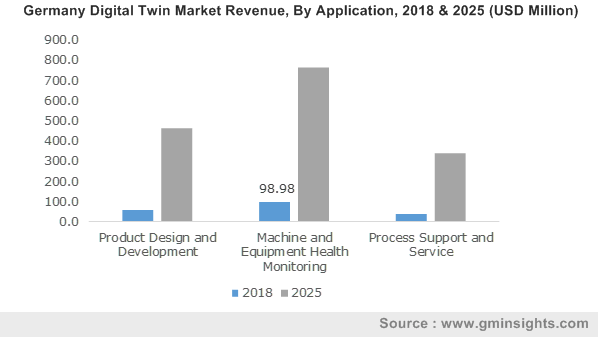APAC digital twin market to record a commendable double-digit CAGR over 2019-2025
Publisher : Fractovia | Published Date : 2019-07-12Request Sample
The emergence of Industry 4.0 has been majorly responsible for propelling digital twin market share. Automation in various sectors has been accelerating the adoption of digital twin technology, consequently impelling the industry size. The automobile sector has also been playing a major role in the expansion of digital twin market, given the adoption of automated technologies in the domain. For instance, Bosch has been comparing sensor-driven production data to a digital twin of production lines running at 100 percent efficiency to improve its output.
Germany Digital Twin Market Revenue, By Application, 2018 & 2025 (USD Million)

The changing digital twin market outlook can be accredited to the increasing adoption of IoT and rapidly rising rate of digitalization across the globe. According to the Annual IoT Barometer of Vodafone, more than a third (34%) of businesses have adopted IoT to some extent. Around 70 percent of the companies have moved beyond the pilot and 95 percent report witnessing clear benefits of their investment. This has led to growing confidence in the technology with 83 percent firms now expanding their deployment of IoT.
Digital twin technology, driven by IoT, has helped companies to reduce asset downtime, optimize process time, decrease time-to-market, and improve operational efficiency. The deployment of the technology on account of its incredible benefits will proliferate the growth of digital twin market as more companies enroll to reap the same benefits.
Digital twinning is benefitting every sector including manufacturing, automotive, healthcare, architecture etc. Last year, Europe’s largest industrial manufacturing company Siemens has reportedly leveraged its MindSphere Internet of Things (IoT) platform to connect production machines at the Monterrey plant to Amazon Web Services (AWS) cloud in less than eight weeks, which helped the plant double its efficiency.
Digital twin technology has provided the manufacturing sector with huge time and cost saving benefits and has vastly enhanced its operations and outputs. The need to increase production, quality and efficiency will contribute to the growth of digital twin industry. The manufacturing sector is projected to account for a share of more than 25% in digital twin market by 2025.
By adopting IoT, digital twin technology and smart products, brands are expected to reduce waste and improve processing time, particularly with packaged consumer products. Digital twinning plays a significant role in tracking and tracing products, services that have become increasingly important to logistic companies and supply-chain managers.
The automotive sector has also been undertaking efforts to deploy digital twin technology to take advantage of the substantial benefits being offered by the technology. For instance, Tesla Motors has been expansively investing in digital twin technology to provide better service and reliability to car owners. The company creates a digital twin of every car it sells and then updates software based on the individual vehicles’ sensor data. This data-driven software development process enables more efficient resource allocation and a markedly better user experience for the vehicle owner.
Automotive companies operating in the digital twin market are focusing on harnessing technological innovations to strengthen their footprint and acquire new customers. Companies like Tesla and Bosch have been raising standards for technological advancements and raising revenue share of digital twin industry.
Architecture is also enhancing the implementation of digital twin technology to establish new standards. Digital twin technology has been helping planners, designers and engineers to improve their designs by creating digital twins of whole cities.
Recently, Singapore made headlines by creating a virtual digital twin of the entire city using software developed by French firm Dassault Systems. It will be an authoritative platform for the region that can be used by urban planners to simulate the testing of innovative solutions in a virtual environment. The Singapore government apparently has invested around $73 million in data-rich, live digital twin of the city.
Digital twin technology can enable megacities to be built with effective solutions and can safeguard developers from making costly mistakes. Other Asian countries are also planning to deploy this latest technology to create digital twins of cities. The Asia Pacific digital twin market is anticipated to register an excellent CAGR of around 30% over 2019-2025.
Deployment of technologies in various sectors to improve efficiency and cut losses will support digital twin market trends. According to Global Market Insights, digital twin market size is anticipated to surpass $20 billion by 2025.